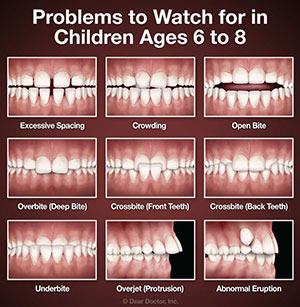Dental Tips from Our Dentist for Kids

Children and Early Dentistry
Innumerable studies and research have concluded on the importance of starting children early in their lives with good dental hygiene and oral care. According to research, the most common chronic childhood disease in America is tooth decay, affecting 50% of first-graders and 80% of 17-year-olds. Early treatment prevents problems affecting a child's health, well-being, self-image, and overall achievement.
The National Institute of Dental & Craniofacial Research estimates that children will miss 52 million hours of school each year due to oral health problems and about 12.5 million days of restricted activity every year from dental symptoms. Because there is such a significant loss in their academic performance, the Surgeon General has made children's oral health a priority.
Parents are responsible for ensuring their children practice good dental hygiene. Parents must introduce proper oral care early in a child's life - as early as infancy. The American Dental Hygiene Association states that a good oral hygiene routine for children includes:
- Thoroughly cleaning your infant's gums after each feeding with a water-soaked infant cloth. This stimulates the gum tissue and removes food.
- Gently brushing your baby's erupted teeth with a small, soft-bristled toothbrush and using a pea-sized amount of children's toothpaste.
- Teaching your child at age 2 or 3 about proper brushing techniques and later teaching them brushing and gentle flossing around 7 or 8 years old.
- Regular visits with their dentist to check for cavities in the primary teeth (baby teeth) and for possible developmental problems.
- Encouraging your child to discuss any fears they may have about oral health visits, but not mentioning words like "pain" or "hurt," since this may instill the possibility of pain in the child's thought process.
- Determining if the water supply that serves your home is fluoridated; if not, discussing supplement options with your dentist or hygienist.
- Asking your hygienist or dentist about sealant applications to protect your child's teeth.
A great time to begin general dentistry is early childhood. Even toddlers can benefit from an early examination, as it can reveal early signs of tooth decay and can offer preventative services that will benefit your children throughout the course of their lives. Each stage of life carries its own oral health concerns, and we are trained to address and combat every one of them.
Thumb Sucking
Sucking is a natural reflex that relaxes and comforts babies and toddlers. Children usually cease thumb sucking when the permanent front teeth are ready to erupt. Typically, children stop between the ages of 2 and 4 years. Thumb sucking that persists beyond the eruption of primary teeth can cause improper growth of the mouth and misalignment of the teeth. If you notice prolonged and/or vigorous thumb sucking behavior in your child, talk to your dentist.
Here are some ways to help your child outgrow thumb sucking:
- Don't scold a child when they exhibit thumb sucking behavior; instead, praise them when they don't suck his or her thumb.
- Focus on eliminating the cause of anxiety - thumb sucking is a comfort device that helps children cope with stress or discomfort.
- Praise them when they refrain from the habit during difficult periods.
- Place a bandage on the thumb or a sock on their hand at night.
Your child won't keep his or her first teeth forever, but that doesn't mean those tiny pearly whites don't need conscientious care. Maintaining your child's dental health now will provide health benefits well into adulthood, as primary (baby) teeth serve some extremely important functions.
For one thing, primary teeth serve as guides for the eruption of permanent (adult) teeth, holding the space into which these new teeth will erupt. The crowns (tops) of the permanent teeth actually push against the roots of the baby teeth, causing them to resorb, or melt away. In this way, the adult teeth can take their proper place.
What's more, your child's primary teeth will be there for most of childhood, helping your child to bite, chew and speak. For the first six or so years, he or she will be relying on primary teeth exclusively to perform these important functions. Until around age 12, your child will have a mix of primary and permanent teeth. You will want to make sure those teeth stay healthy and are lost naturally — when it's time.
Your Child's First Teeth

Your child's 20 baby teeth will begin to appear usually between six and nine months, though in some cases it may start as early as three months or as late as twelve months. The two lower front teeth tend to erupt first, followed by the two upper ones. The first molars come in next, followed by the canines (eye teeth). Sometimes your baby can experience teething discomfort during this process. If so, let us know and we will advise you as to the best course of action.
Your infant's gums and newly erupting teeth should be gently wiped after each feeding with a water-soaked gauze pad or damp washcloth. Any teeth that have fully come in should be cleaned with a small, soft-bristled toothbrush and no more than a thin smear of fluoridated toothpaste. Starting at age 3, you can teach your child to brush with a pea-sized amount of fluoride toothpaste. Your child may need your help with this important task until about the age of 6.
Baby's First Dental Appointment
The American Academy of Pediatric Dentistry recommends that you bring your child in to see us by his/her first birthday. Though this may sound early, we can teach you proper pediatric oral hygiene techniques, check for cavities, and watch for developmental problems.
Various forms of tooth decay can affect babies and small children. Early Childhood Caries (tooth decay) can develop rapidly, progressing from the hard, outer enamel layer of a tooth into the softer, inner dentin in six months or less.
Most of all, we want to make sure your child has a positive experience at our office and will be a regular visitor for years to come.
Pediatric Dental Treatments
There are a variety of dental treatments we provide to prevent tooth decay in children or to save or repair teeth when necessary. They include:
Topical Fluoride — Fluoride incorporates into the enamel of teeth, making it harder and more resistant to decay. Although there is a small amount of fluoride in toothpaste and in some drinking water supplies, we can apply a higher concentration onto your child's teeth for maximum protection
Dental Sealants — We can apply a plastic coating that prevents cavities by sealing the little grooves on the chewing surfaces of back teeth known as "pits and fissures." These little crevices become the perfect environments for decay-causing bacteria. Immature tooth enamel is more permeable and therefore less resistant to tooth decay. Dental sealants are easy to apply and provide years of protection
Root Canal Treatment — Perhaps you have had a root canal treatment yourself, to save an injured or severely decayed tooth. Well, sometimes children need root canals, too. As mentioned above, baby teeth are important guides to the permanent teeth that are already forming beneath your child's gums. Therefore, saving them from premature loss can help prevent a malocclusion ("mal" - bad; "occlusion" - bite) that requires orthodontic treatment.
Bonding — Chips and minor fractures to front teeth — common childhood occurrences — can be repaired with tooth-colored bonding materials. These lifelike resins made of plastic and glass can be used on baby teeth as well as permanent teeth and last until the youngster has completed facial growth.

Orthodontic Concerns
By around age 7, most malocclusions have become evident. Interceptive orthodontic treatment around this time can help direct proper tooth positioning and/or jaw growth, eliminating or simplifying the need for later treatment. There are many orthodontic problems that can be detected early and are examples of why a trained professional should evaluate your child during his/her growth and development.
Sports & Your Child's Teeth
If your child is active in sports, we highly recommend a custom-made mouthguard. It is estimated that mouthguards prevent more than 200,000 injuries each year. We can have a mouthguard custom-made specifically for your child using a model of his or her teeth that will offer greater protection than an off-the-shelf model. It's an investment that pays off highly in the form of reduced pain, suffering — and dental expenses down the road! Please ask us about mouthguards at your child's next appointment.
